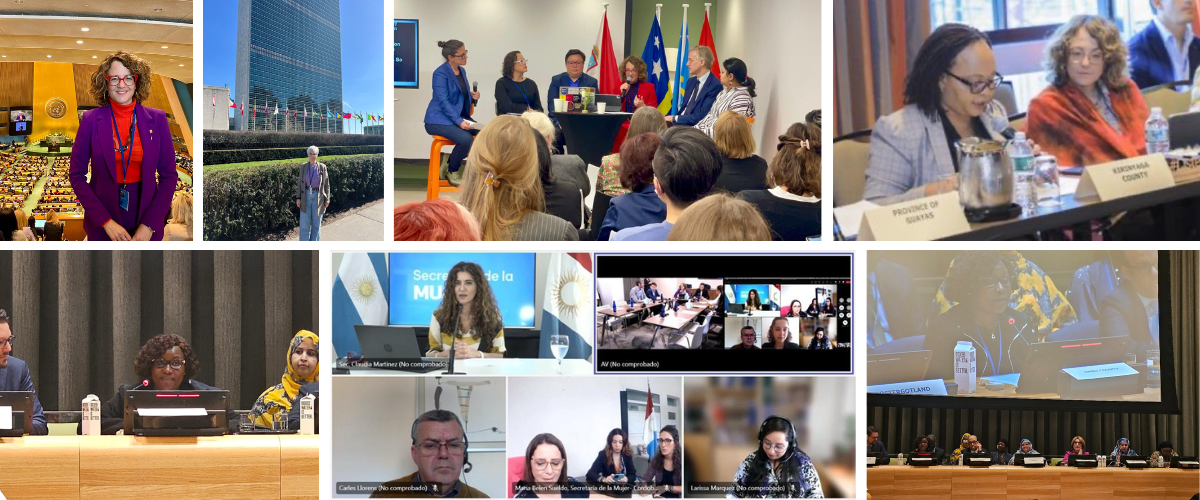The Gender Working Group present at the United Nations CSW68

For the first time, the ORU Fogar Gender Working Group was participating in the 68th Session of the United Nations Commission on the Status of Women. The meeting took place at a time when all the participants confirmed that, in many countries and after many years of progress, women's rights were experiencing a setback. Claudia Martínez, Secretary of Women of the Province of Córdoba, Argentina, expressed it best when she said: “We are going through difficult times where women's civil rights and also sexual diversity are attacked. We must be more united than ever so that no one shuts us up. In some regional governments, in any case, we can have protection.”
In a work meeting, preparatory to the CSW68 sessions, in which the two promoters of the Group, Claudia Martínez, and the regional minister of Equality and Feminism of Catalonia, Tania Verge, participated, the milestone of facing the organized debate was confirmed at the United Nations. “In the United Nations and especially in UNFPA (United Nations Population Fund), the agency for sexual and reproductive health - explained Tania Verge - interesting spaces are opening up for the participation and intervention of the regions. "You must be there to advance women's rights at this time when the milestones achieved in recent years are declining in some geographies."
The regional member representatives of ORU Fogar participated in very diverse events. All of them were, in any case, at the CSW68 Local and Regional Governments Day. At this event it was made clear that, beyond central governments, local and regional governments, civil and economic society are key to the equality agenda. For this reason, it was demanded that the subnational level of government have inclusive, gender-sensitive and equitable financing, which makes it easier for women and girls to prosper.
At all times there was talk of how to empower women and how, through local and regional governments, they could influence decision-making at the national and international level. Miren Elgarresta, from Emakunde, the Basque Women's Institute, explained; “Our strategy for equality includes extensive work in alliances: at the international level, but also at the local level and working with all our municipalities.”
Anne Waiguru, Chairperson of the Kenyan Council of Governors, said: “In our country, devolved governance seeks to promote social and economic development, and the provision of easily accessible nearby services. Deliberate efforts to empower women, who are the pillar of our societies.” She defended, in this sense, that “a solid social protection system is essential to break the devastating cycle of poverty.”
The interventions of Minister Tania Verge and the Ecuadorian prefect of Guayas, Marcela Aguiñaga, focused their intervention on very specific aspects. The Catalan affirmed that sexual and reproductive rights are essential for a feminist transformation. “They are,” she said, “human rights, which is why they are at the center of our political agenda.” She defended the need for unapologetically feminist politics and the creation of ministries for equality, like the one that exists in Catalonia. The Ecuadorian prefect, representing CONGOPE, pointed out the need to recognize the care work that women basically carry out and had a special reference to indigenous women.
Already at the event 'Encouraging Women's Political Participation for Equitable and Strong Public Institutions', the Kenyan governor of Embu, Cecily Mbarire, stated: “investing in women in politics is essential to build a pool of female leaders, who will help solve problems associated with perpetual poverty and care for the vulnerable and marginalized in society." She advocated having a special focus on women from marginalized or underrepresented groups, women with disabilities and women from low socioeconomic resources. "If we want to create a more fair and equitable for all women - she stated -, we must include everyone! " Governor Mbarire concluded by arguing that it is essential to provide an effective response to citizens to strengthen public institutions with adequate financing, staffing and institutional reforms necessary.










































































